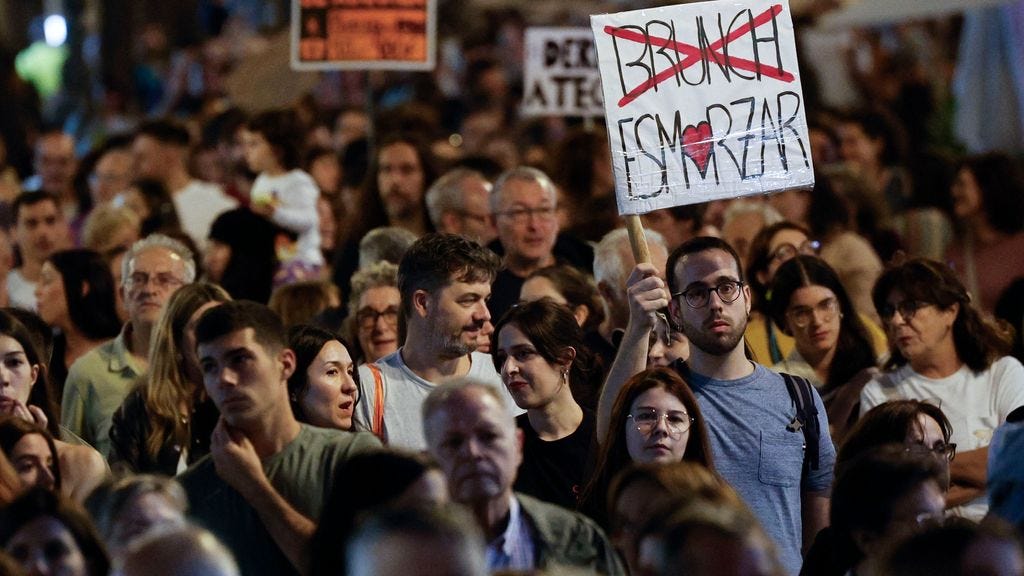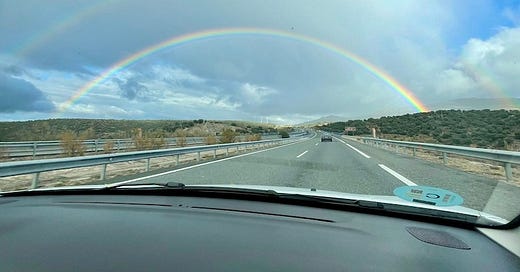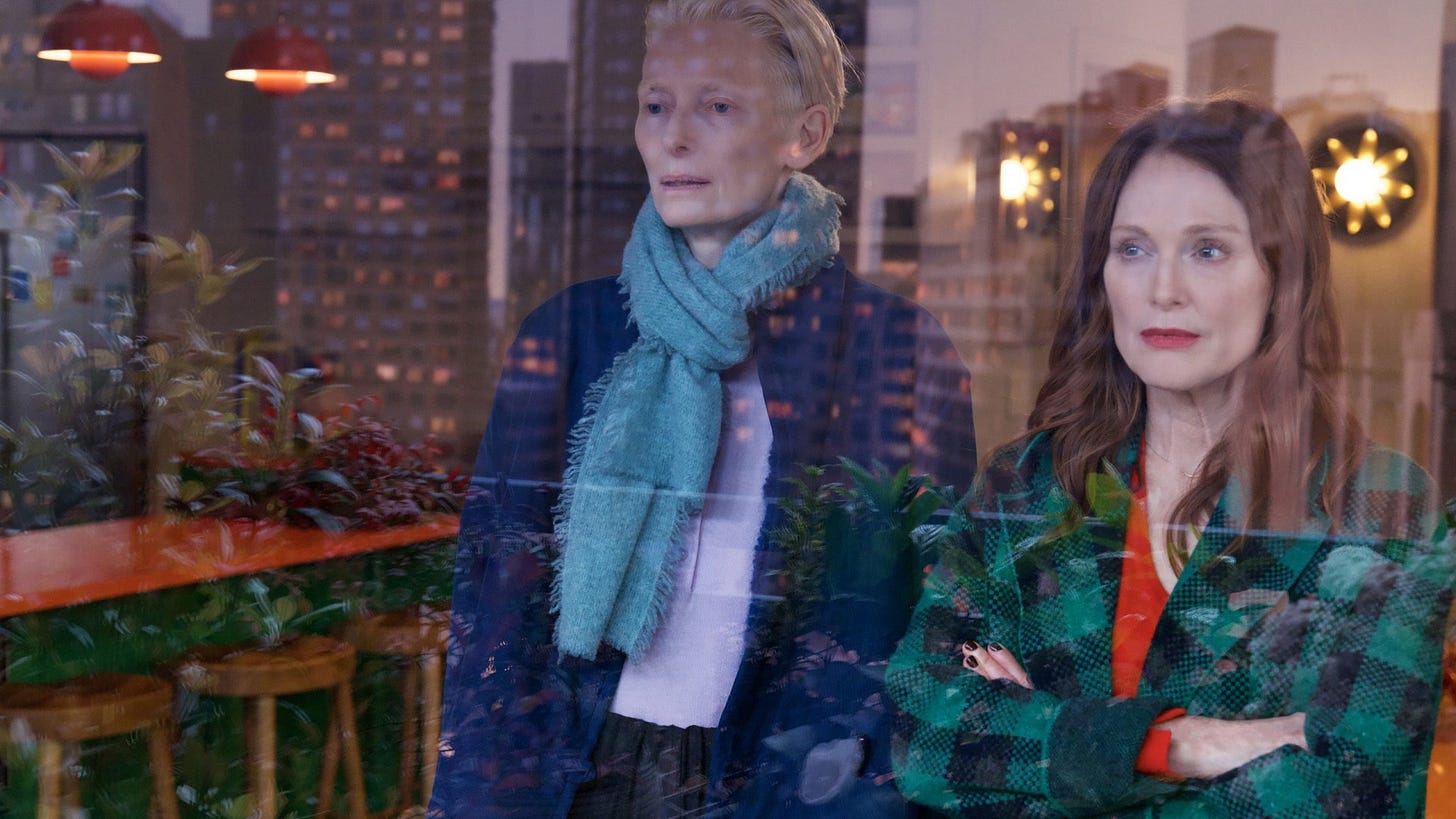Sunday Smörgåsbord #058
Salem witches, Spanish protests, and Latvian names. Plus: Almodóvar's The Room Next Door.
❤️ Thanks for reading today’s edition of Scrambled Eggs. If you liked this post don’t forget to hit the heart to let me know and help others find my writing.
Ufff. What a weekend!
I’m writing this holed up in an Ibis in the centre of Madrid, after spending the weekend with the most phenomenal women writers at a Retiro de Escritoras in Avila.
I’ve heard so many wonderful stories these last two days: some fully-formed, others green shoots, and some big crashing waves of a tale. Ones that force you to take notice.
As a result, I am emotionally exhausted! But aiming to write more on this - and the idea of creative community in general, in the coming weeks.
Before I left today, though, I slipped into the little chapel next to the casa rural we stayed in, to say a little prayer to St Teresa. I was only halfway through when I realised that, for the first time, I was praying in Spanish. I asked her to send me a sign. Ninety minutes later, on the car drive back to Madrid, we saw this.
My third rainbow in ten days! I guess if you’re talking with a Spanish Saint, speaking in their language really speeds things up…
Have a wonderful week,
Emma x
🍳 Recent servings, in case you missed them…
❤️ If you liked this post don’t forget to hit the heart to let me know and help others find my writing.
📮 And if you’re not yet subscribed, all editions of Sunday Smörgåsbord are free forever. Sign up for free and get next week’s in your inbox
📰 Features & Podcasts
NB: [PW] signifies a paywall, though some providers allow you to read a set number of articles for free.
‘These Paddington moaners are a bit rich’, The Times [PW]. This beauty of a rant perfectly skewers the obnoxious entitlement that multi-million and billionaires have over the neighbourhoods they buy up and pimp out. It’s even done that rare thing: unite the below-the-line comments. Choice quote below:
Why do billionaires want to live in a row? Is it a security thing, like roosting chickens? Can they feel a sense of “neighbourhood” only among other billionaires?
Are they worried that if they went next door to borrow some sugar and there wasn’t a billionaire living there, they might be given some sort of less sweet, non-billionaire sugar?
Last weekend was one of the best Sunday Times I’ve read cover-to-cover in ages, and included two fascinating interviews, both by Decca Aitkenhead. The first was with Olympian Chris Hoy on his terminal cancer diagnosis, and the second with Yulia Navalnaya, widow of Russian opposition leader Alexei Navalny. Reading both of their stories I was struck by how acceptance and defiance can co-exist.
‘As a middle-aged man, I would’ve saved loads on therapy if I’d read Baby-Sitters Club books as a kid’, The Guardian. This was a sweet little article I happened to stumble on about a series of books I adored as a child and a forty-two year old man reading them for the first time. God knows how I got onto them myself: they were the sort of never-ending American series my Mum vaguely looked down on, but reading them did inspire me to start a non-existent babysitting business with friends. That said, not one person trusted us to look after their kids, I can’t think why (probably as I was about ten). Are these books still popular now? Or was it just a millennial thing to so enjoy reading about teenagers in the States? As my dear friend and mentor
says, the US must be the only place in the world to have made an entire cultural genre out of the high school experience.‘Pedro Almodóvar on The Room Next Door: ‘Give me more Oscars! They’ll be welcome’’, The Times [PW]. I really should write an entire essay one day on how Pedro Almodóvar changed my life. Watching his films, for me, is like unlocking my core self. Not because I’m as stylish as his star characters, fluent in Spanish, nor a Madrileña, but because his films take me back to Saturdays spent getting the bus to Jericho in Oxford with my best girlfriends to watch his latest release at the Phoenix Picturehouse. His films felt like a huge cultural awakening in my teenage years, and watching his first feature-length English language film The Room Next Door (see: Arts, below), I felt this strange surge of pride for what is a huge achievement for anyone’s 75th year. And indeed, this article demonstrates how Almodóvar’s reckoning with mortality informed the film.
🎨 Arts, Culture & Entertainment
The Room Next Door, dir. Pedro Almodóvar (2024). I had to go and see this as soon as it came out. Trying to summarise it has left me flailing (I guess really should write an essay on it), but let’s try. First off, I loved the tone of the film. I could really sense Almodóvar’s own joy at producing this film, with the references to classic American art, New York as character (in place of Madrid), and the worldliness of his main characters Ingrid and Martha. Seeing Almodovar’s Madrid transposed onto New York was an ‘obvious’ touch and yet still felt fresh: the blood reds, vivid greens, and deep mauves (I particularly loved Julianne Moore’s ever-changing handbag and coat collection). Nowadays we tend to see the Big Apple in shades of grey concrete, mixed with black metal and glass - this palette was Autumnal but refreshing. The dialogue was clunky (the Spanish subtitles read more naturally than the spoken words in English), and whilst I loved what he did with Martha’s daughter, I can see how others found it hackneyed. Overall though it hit the spot for me - I left really wondering about what it would be like to come home to that closed door, and whether I’d have the guts to accompany someone on such an important journey.
Hocus Pocus, dir. Kenny Ortega (1993), or: another film about women grappling with their mortality - this time, three Salem-era witches who are back from the dead and keen to stay that way. This was one of those films I watched as a kid only to return to it years later wondering how much it’d dated. Pleasingly, it still holds up as a fast-paced, entertaining and ‘seasonal’ romp, with the added bonuses of a young Sarah Jessica Parker, a non-annoying talking cat, and some actually good child-star acting (see: Thora Birch - what ever happened to her? She was great!) That said, for a 90’s PG rating it was way more suggestive than I remembered it. I’m sure Almodóvar could have a field day with a remake.
📺 What have you seen lately that’s worth a read, watch or listen? Let me know in the comments.
🍹 Lifestyle

‘Miles de manifestantes reivindican en Valencia el derecho a la vivienda’, RTVE. Last Saturday I joined a huge, peaceful protest in Valencia city centre to demonstrate against the rising cost of rent and unregulated tourism. Most of my British friends think of Spain as a cheap place to live - and yes, it’s true, you can still get an almuerzo bocadillo and a beer for about five or six euros, but the cost of rent has soared since I moved here five years ago whilst salaries have not. A good friend of mine has lived in her current apartment for 3 years as a perfect tenant. The landlady now wants to put the rent up from around 800 EUR per month to 1300 EUR a month! It goes without saying that her salary has not jumped by a similar percentage. It doesn’t help that landlords generally get away with murder here (this is the first city I’ve rented where my deposit has been openly used as the landlord’s piggy bank). As of writing, the protestors are still camped out in the Plaza de Ayuntamiento. I hope the politicians are listening.
‘Why you will almost definitely have to change your name when speaking Latvian’, Deep Baltic. Since obtaining Latvian citizenship last November I’ve been trying to learn some Latvian in my spare time. It’s hard. I’d go as far as to say I’m finding it harder than simplified Chinese lessons I took when I lived in Singapore. One of the biggest reasons is Latvian’s seven cases, which means words can change their endings at least seven ways depending on how you use them in a sentence. In addition to this, endings also can change due to the gender of the person you’re talking to (or based on your gender - it depends), and whether we are talking singular or plural. I literally have almost no idea what is going on in most of my lessons… and my teacher says it’s entirely normal! Still I persist. I was doing my homework this weekend and trying to find online resources to help me better understand the grammar (such resources don’t exist, as far as I can tell), and found this article which gives a flavour of Latvian’s complexity, beginning with what we call ourselves. Yes, even our legal names are up for grabs in the Latvian language - and I can verify this personally: the name on my Latvian passport is a version I’ve never seen before.
That’s it for this week. I hope you find something in this list that sparks joy or curiosity.
If you’ve got any recommendations on articles, podcasts, Substacks or shows for me to dive into, please drop them in the comments. Until next time!
❤️ Thank you for reading. If you liked this post don’t forget to hit the heart to let me know and help others find my writing.
📮 And if you’re not yet subscribed, all editions of Sunday Smörgåsbord are free forever. Sign up for free and get next week’s in your inbox.








I love the rainbow sign. 🌈🫶🏻
Ufff is my favourite sound in the world :) It was so good to meet you Emma! I will be seeing you around I'm sure.